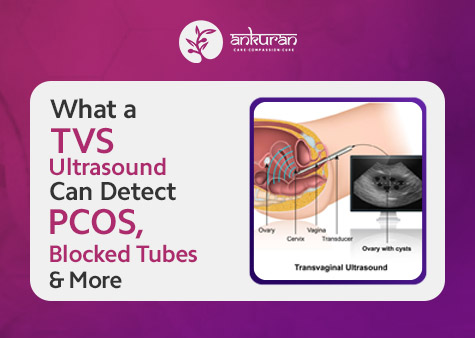A TVS ultrasound (Transvaginal Sonography) is a specialized internal scan that provides detailed images of the female reproductive organs. It’s widely used to diagnose conditions like PCOS, check for blocked tubes, monitor early pregnancy, and detect any abnormalities in the uterus or ovaries. The scan is done using a thin probe inserted into the vagina, allowing doctors to get a clearer picture compared to abdominal scans.
What is a TVS ultrasound done for?
A TVS ultrasound is performed to examine the uterus, ovaries, cervix, and fallopian tubes with high precision. Doctors recommend it for detecting cysts, fibroids, endometriosis, and other gynecological issues. It also plays a major role in diagnosing early pregnancy, evaluating fertility concerns, and checking for causes of pelvic pain or abnormal bleeding.
For fertility cases, a USG TVS helps track ovulation and assess follicle growth.
In which week is TVs done?
A TVS in pregnancy is usually done between the 6th and 8th week to confirm gestational sac placement, detect heartbeat, and check for multiple pregnancies. It can also be done earlier if there are symptoms like spotting or severe pain.
Is TVs compulsory in Pregnancy?
No, TVS ultrasound for pregnancy is not always compulsory, but doctors recommend it in certain situations, such as suspected ectopic pregnancy, unexplained bleeding, or to confirm early fetal development.
What Is the Purpose Of TVS?
The main purposes include:
- Evaluating reproductive health – Detecting ovarian cysts, fibroids, PCOS, endometriosis, or any abnormal growths in the uterus and ovaries.
- Fertility assessment – Monitoring follicle size, ovulation, and endometrial thickness to guide conception or IVF treatments.
- Pregnancy confirmation and monitoring – TVS in pregnancy helps confirm early pregnancy, locate the gestational sac, check heartbeat, and rule out ectopic pregnancy.
- Investigating abnormal symptoms – Unexplained pelvic pain, irregular bleeding, or infertility can be assessed with USG TVS for an accurate diagnosis.
In short, TVS is a precise, safe, and highly informative scan that helps doctors make quick and reliable treatment decisions, whether for fertility issues, early pregnancy care, or general gynecological concerns.
Can We Detect Pregnancy In TVS?
Yes, a TVS ultrasound can detect pregnancy as early as 4-5 weeks by identifying the gestational sac.
Can TVS Detect Heartbeat?
By 6-7 weeks, TVS in pregnancy can clearly detect the baby’s heartbeat, providing reassurance of normal development.
Can TVS Detect Miscarriage?
Yes, it can help confirm miscarriage by showing an empty gestational sac or absence of fetal heartbeat.
Can TVS Detect Implantation?
While it can detect early pregnancy changes in the uterus, implantation itself is too microscopic to be seen.
Can TVS Ultrasound Detect Gender?
No, TVS ultrasound is not used to determine the gender of the baby, as this is restricted by law in India.
Can TVS Detect Blocked Fallopian Tubes?
Indirectly, yes. While a USG TVS cannot directly visualize blockages, it can detect fluid accumulation (hydrosalpinx) which suggests blocked tubes. For confirmation, other tests like HSG are needed.
What Is the Cost of TVS in Pregnancy?
The USG TVS test price varies by location and clinic, ranging from ₹800 to ₹2500. The cost of TVS ultrasound may be higher if additional fertility assessments are included.
What Are the Risks of A TVS Scan?
A TVS ultrasound is considered very safe. It does not use radiation and has no known long-term risks. Mild discomfort may occur during insertion of the probe.
What Is the Difference Between A TVS And USG?
A standard USG (ultrasound) uses an abdominal probe placed on the belly, while USG TVS uses a vaginal probe to get closer to the reproductive organs, providing sharper and more accurate images.
Is A TVS Test Painful?
The test is generally not painful, though it may feel slightly uncomfortable. Relaxing during the procedure can make it easier.
Is TVS Safe During Pregnancy?
Yes, TVS ultrasound for pregnancy is safe and does not harm the baby or mother. It is frequently used in early pregnancy to monitor fetal development and rule out complications.
Conclusion – Ankuran IVF Clinic: Your Partner in Women’s Health
At Ankuran IVF Clinic, we understand that fertility concerns and pregnancy monitoring require the most accurate diagnostic tools. Our advanced TVS ultrasound facilities help detect conditions like PCOS, fibroids, and blocked tubes with high precision. For expecting mothers, we provide gentle and safe TVS in pregnancy scans to ensure your baby’s healthy development from the very start.
Whether you are undergoing fertility treatment, experiencing symptoms, or simply want a detailed reproductive health check-up, Ankuran IVF Clinic offers expert care with compassion and confidentiality.
- How Much Is the Cost of CVS Test and Should You Do It?
- What Is the Mild Polyhydramnios Range? Complete AFI Guide Week by Week
- Is Counseling During Pregnancy Right for You? Everything You Need to Know
- How to Understand Trisomy 21 Normal Value: From Screening to Diagnosis
- Can Babies with Fetal Growth Restriction Survive? Understanding IUGR Survival Rates



No Comments